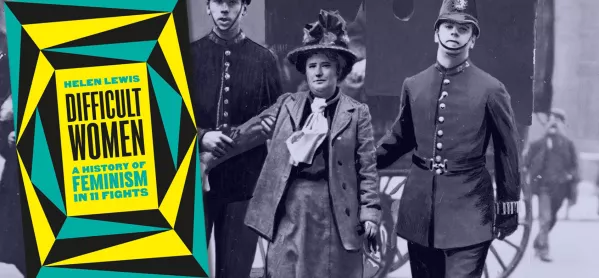- Home
- Book review: Difficult Women: A history of feminism
Book review: Difficult Women: A history of feminism

Difficult Women: A history of feminism in 11 fights
Author: Helen Lewis
Publisher: Penguin Vintage
Details: 368pp, £16.99
ISBN: 9781787331280
This is not a book about teaching. It is not even a book about education, although there is a chapter about it. Teachers looking for tips on pedagogy or approaches for the classroom clearly won’t find them here.
But if you read this, I guarantee its lessons will be relevant to you as a teacher.
The status of women is no fringe issue. How we teach students about equality matters. How we treat students matters. Helen Lewis does much to remind us of this.
On the face of it, Lewis’ book is Good Night Stories for Rebel Girls, but for grown-ups. It is a collection of fascinating, well-researched and vividly told biographies of women who made tangible contributions to the lives we live now. But Lewis avoids simplistic hagiography. Her approach revels in messiness. The book is challenging; deeply honest; even edgy in places.
Feminism: fighting for women’s rights
The title Difficult Women says it all. These are not portraits of perfect feminists, and certainly not of perfect people. Lewis’ sketches of these women do not leave out the tricky bits.
She does not skirt around the violent acts of some suffragettes, the failures of some activists, the unpalatable conclusions of some radicals, or the way feminists can fall out with each other, despite the call of the common fight. She allows these people to be difficult, contrary, gobby, unpleasant, as anyone can be.
There are some I certainly wouldn’t want to split a KitKat with, but this is not why they were selected for the book. Flawed people can still be heroes. In fact, Lewis’ thesis is that flawed people are much more likely to be.
Or should I say heroines?
Because the other key difficulty Lewis is dealing with here is how to think about feminism. When people get dogmatic about feminist concerns, I often think to myself “Isn’t it a little bit more complicated than that?” Feminism is in itself a difficult term, and it is refreshing that Lewis recognises this. Is feminism the pursuit of equal opportunities, or outcomes? Does equality mean fairness or sameness?
Does a feminist want the best candidates to be appointed to top jobs, even if 50 per cent of them aren’t female? Can you think the patriarchy is a problem, while not blaming your loved ones for being part of it?
Although Lewis does not always deal with these questions with the depth needed to get to a truly satisfactory answer (to be fair, the book has other concerns), she does at least recognise the difficulties.
A long way to go
Like me, Lewis grew up in an age when it is tempting to think that feminism’s major battles are won, in this country at least. Women have the vote, we can work, we can get degrees, we do well in public exams. There have certainly been no obvious bars in my life because I happen to be female.
Perhaps this is because, as Lewis highlights, education is one area where equality between the sexes has been pretty conclusively achieved.
This triumph for women’s education is down, in part, to the fight of Elizabeth Garrett Anderson, the first woman to qualify as a doctor, and a cousin, as it happens, of one of the women who shaped Bedales, Amy Garrett Badley.
Elizabeth Garrett Anderson got around the fact that admission to medical school was closed to women by sitting the examinations set by the Society of Apothecaries.
This was not, by all accounts, because the Society of Apothecaries was particularly forward-thinking, but perhaps the opposite. It seems that it never occurred to them that a woman might take their exams, let alone pass them.
Despite the relative success of the fight for women’s equality in education, by telling stories about past struggles Lewis shows that there is still work to be done.
Primary problems
She outlines an example that will speak loudly to many of us. In primary schools, only around 15 per cent of the workforce is male, yet frequently they make it to headship, despite (because of?) the fact that, overwhelmingly, primary school teachers are female.
In fact, Lewis shows, some men have felt pressured to go in this direction or have felt it hard to fit in as a classroom teacher. Something in our model of education has seemingly made it OK for women to care, but less OK for them to lead. The opposite problem faces men.
If you want a book specifically about the fight for women’s education, this is not it. If that’s what you’re after, read Bluestockings: The remarkable story of the first women to fight for an education by Jane Robinson.
But do you know what? Read both. Helen Lewis’ book is challenging, punchily written and refreshing in equal measure, and a joy to read. It made me think, rethink, and nudged me out of my complacency.
For this, Lewis is to be thanked and applauded.
Clare Jarmy is head of academic enrichment and Oxbridge, and head of religious studies and philosophy, at Bedales School in Hampshire. She tweets @clarejarmy
You can support us by clicking the book’s title link: we may earn a commission from Amazon on any purchase you make, at no extra cost to you
Keep reading for just £1 per month
You've reached your limit of free articles this month. Subscribe for £1 per month for three months and get:
- Unlimited access to all Tes magazine content
- Exclusive subscriber-only stories
- Award-winning email newsletters


